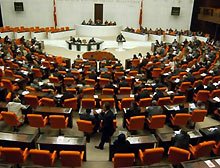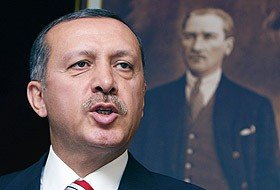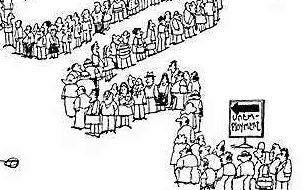Apparently, one of the Justice and Development Party's (AKP) main targets has been to increase the income per capita to 10,000 dollars by 2013. This has been openly declared in the recently presented government programme. In addition, the government wants to increase the national income to 800 billion dollars within seven years.
Doubtful figures
In 2006 the national income was declared to be 400 billion dollars. In order to achieve the target of 800 billion, there would have to be an uninterrupted growth rate of 11 percent. This has not been witnessed in any other country. The target is not based on any scientific reality; what is incredible is that there has been no reaction to this propaganda.
AKP speakers claim that they increased the size of the Turkish economy by 7.6 percent in their four years of government. The national income is said to have risen from 182 million to around 400, which would mean an average yearly growth rate of 16 percent. The party further says that they have achieved a per capita income of around 5,500 dollars.
Its proclaimed aim to increase per capita income to 10,000 dollars by 2013 is just as unrealistic, also taking into account that Turkey's population will incrase to around 80 million.
In short, both the claimed per capita income of today and of 2013 are delusions. Why?
Foreign currency has decreased in value
Let us first look at "getting rich through the dollar". According to calculations of the Central Bank, foreign currency has become 18 percent cheaper in real terms between 2002 and 2006. This means that the Dollar and the Euro should be 18 percent more expensive today, if they had followed the price movements of foreign countries we trade with and the inflation in Turkey.
At the end of 2002, the dollar was worth 1.64 YTL; by the end of 2005 it was 1.34 YTL. It had fallen by 18 percent. During that time, prices rose by 33 percent. Even if there had been zero growth, the incongruity between inflation and foreign currency rate would have shown a growth rate of 60 percent (in terms of dollars) in those four years.
Deception based on currency market
The government was able to show development in terms of dollars and use it as propaganda. Thus it was able to show an increase of per capita income of 239 billion dollars in 2003 to 400 billion in 2006 and claim an annual growth rate of 16 percent. These claims are mostly deceptions which could be pulled of because of speculation with foreign currency: raising interest rates and taking money out of circulation, thus making foreign currency cheaper.
| GNP in current prices (million YTL) | GNP | Average Dollar Rate | Growth Rate (%) | Population | Per capita income ($) |
2003 | 356,681 | 239 | 1493 | 5.9 | 70,712 | 3,383 |
2004 | 428,932 | 299 | 1431 | 9.9 | 71,789 | 4,172 |
2005 | 486,401 | 361 | 1346 | 7.6 | 72,065 | 5,008 |
2006 | 575,784 | 400 | 1440 | 6.0 | 72,974 | 5,477 |
We are talking about a naive approach which hopes to continue this policy of "cheap foreign currency" and to achieve an annual growth rate of over ten percent.
The wind is turning
The two assumptions are false. For one, the AKP experienced growth during 21 quarters because it happened upon an extraordinarily favourable economical situation. The financial turbulence and crises which affected the world economy in 1997 had an end by 2002; international movements of capital had been revived.
Foreign resources movement in Turkey followed this new trend and increased uninterruptedly from 2003 to 2006; within five years, foreign capital investment increased to 114 billion dollars. By working faithfully with the IMF, the AKP government was clever enough to reap the benefits of the growth caused by foreign sources. But will this trend continue?
Stagnation of international capital
It is widely believed that this international economic trend is coming to an end. Compared to the first half of 2006, the first six months of this year have showed a change in foreign investment in Turkey. The growth rate will decrase with the stagnation of international capital movements. The question on everyone's lips is what the 90 billion dollars stock of "hot money" which have been tied up in YTL by foreign investors will do to the exchange rate if they are taken out of the country.
Not real growth
In addition, the much-talked about per capita income of 5,500 dollars has been a growth which has caused impoverishment, a growth without quality. This growth has not been able to support the foreign resources and capital savings; it took over from national savings. Credit cards and consumer credits caused many people to accumulate debts. A formented consumption has taken people hostage.
Exports were increased by lowering prices to the lowest possible level. Using the favourable exchange rate, the increase in imports has forced local suppliers to close down. Touristic assets were nearly given away for free. But there is a limit to everything.
People are suffering under their debts, trying to pay them off with more debts and using up their last savings. There have been serious problems with pay-backs.
In summary, this low-quality growth will have to have an end. It has not improved the relations of distribution or the problem of unemployment. (MS/TK/AG)











